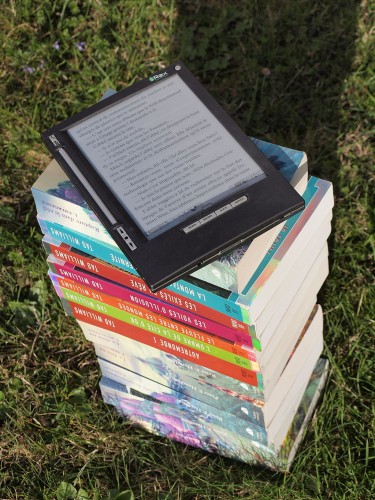There is a time, towards the end of primary school and for the most part of high school, when the concept of reading for pleasure is decidedly uncool. Typically, at this age, kids are getting their first taste of freedom, being able to visit places on their own and being independent for the first time. It is perhaps this that causes this ‘uncoolness’ surrounding reading. Why would you sit around and read when you could be out and about doing whatever you wanted with no adult supervision? It seems decidedly boring, and associated with the horrors of school, which at this age is slowly becoming more demanding, and more focused on exams instead of enjoyment.
During this period, as a person who has always loved reading, it seemed ridiculous that there could ever come a time when someone would judge you for not having read enough. However this is what happens. Even The Office’s resident bully, Chris Finch, understands the importance of reading to seem educated, as he pompously yet slightly waveringly says ‘I read a book a week’, in order to intimidate the opposition before the pub quiz. In certain circles, largely university based and then moving into the workplace, there is definitely a sense of competitiveness surrounding your personal library. It’s not just quantity of books either, it’s quality. For a large group of people, there is no point having read one hundred books in a year if they all came out of the ‘beach reads’ section of Waterstones, and none of them are to be found on a university reading list.
The canon, a collection of works of literature deemed worthy by an imaginary group of old white men in suits, is often used as an indicator of how well read you are. Never mind if you’re discovering literature in another language, or picking up your first book in ten years, if it’s not a part of the canon, then to some people it’s a waste of time.
Depending on what you’re doing with your life, it is of course expected of you that you have read certain things. If you’re a literature student, then most of your reading should be acclaimed works that help your degree and your studies. However, beyond that, as long as people are reading, the content of those books shouldn’t be judged. It affects no one else other than that person, and if they’re happy with what they are reading then that’s all that matters.
There’s nothing worse than forcing yourself through a book because you know that you should read it, or because people will judge you for not having done so, and not enjoying any of it. You’re probably decidedly less happy than the person sat opposite you on the train who’s reading their celebrity autobiography or their romantic fiction, but loving every page.
There’s a cyclical nature to our attitude towards books. At first, reading is something that most children enjoy, as very young babies use books as tools for learning and as they age the stories inside of books are captivating. Then, it becomes uncool to be reading anything at all, before a stage of maturity in which it is frowned upon to be reading the wrong types of books. Of course, this is all relative and may not be true of every person’s experiences, but it’s probably the situation for those who’ve followed a traditional education route, and attended university. Ultimately, regardless of whether you’re studying literature, or just reading for pleasure, books should be for our enjoyment and it’s therefore pointless to worry what others will think about your choices. If you ruminate on this too much, then you’re not enjoying it, and therefore what’s the point?



